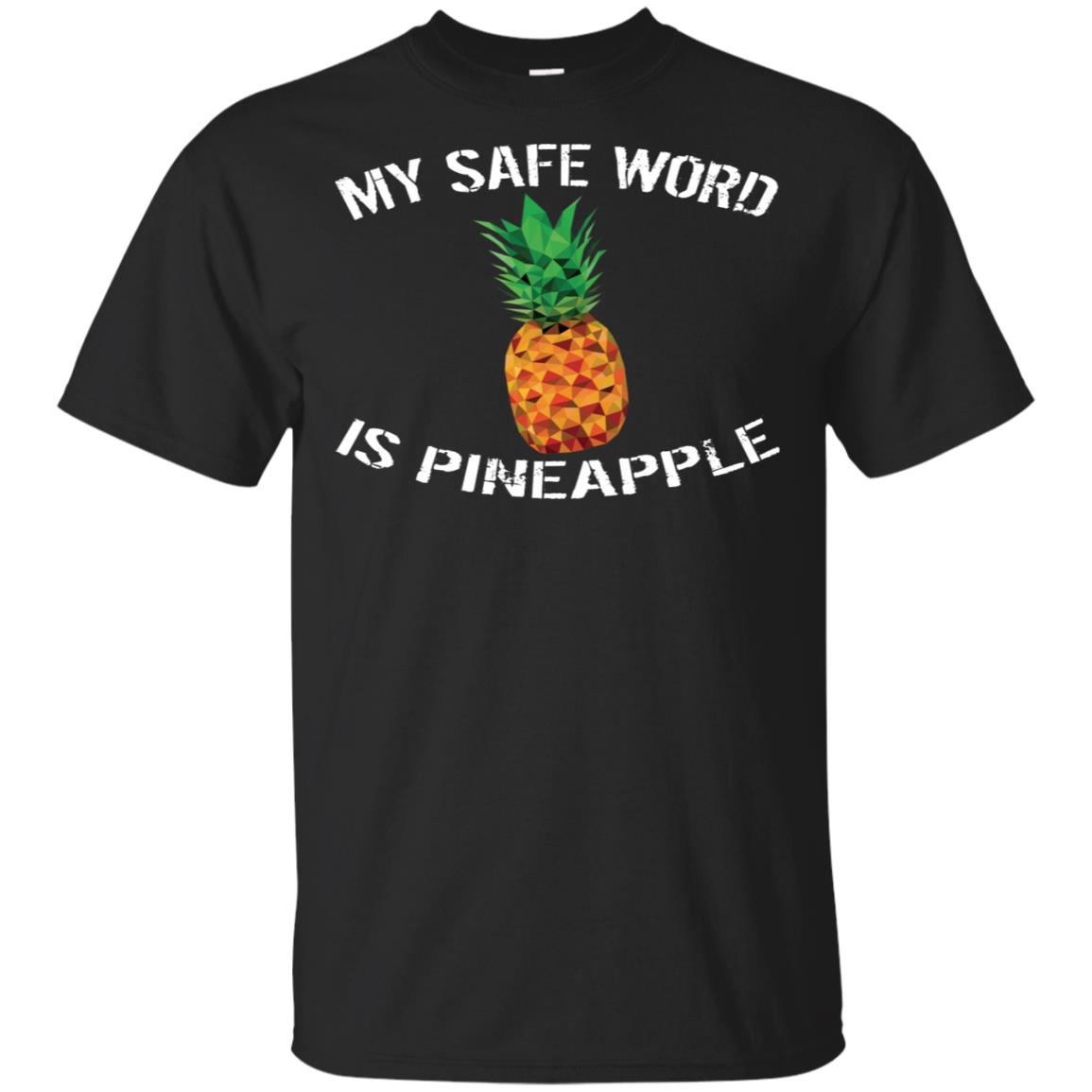Safe words have become increasingly prevalent in various aspects of modern life, from personal relationships to pop culture references. The phrase "my safe word is pineapple juice" has gained traction as a humorous yet meaningful way to discuss boundaries and consent. This article delves into the significance of safe words, their applications, and how phrases like "pineapple juice" can serve as effective communication tools. Whether you're looking to deepen your understanding of safe words or simply curious about their role in everyday life, this guide offers valuable insights.
At its core, the concept of a safe word revolves around establishing clear boundaries and promoting mutual respect. By using a phrase like "pineapple juice," individuals can create a lighthearted yet effective way to signal discomfort or the need to pause. This approach not only fosters open communication but also ensures that all parties involved feel safe and respected.
In this article, we will explore the history, applications, and importance of safe words, with a focus on how phrases like "pineapple juice" fit into the broader conversation about consent and boundaries. Whether you're new to the concept or looking to refine your understanding, this guide provides actionable insights and practical tips.
- Everything But The House
- Capital City Comedy Club
- Dawn Food Products Inc
- Medallas De Honduras En Los Juegos Paralimpicos
- Mesa Verde National Park Colorado
What Are Safe Words?
Safe words are pre-agreed-upon phrases or terms used to communicate boundaries, comfort levels, or the need to pause during activities. Historically, they have been most commonly associated with BDSM practices, where consent and communication are paramount. However, the concept has expanded beyond niche communities and into mainstream culture, as evidenced by phrases like "my safe word is pineapple juice."
The use of safe words ensures that all parties involved in an activity can express discomfort or the need to stop without fear of misinterpretation. This is particularly important in scenarios where traditional verbal cues might be unclear or misunderstood.
Why Use Safe Words?
- Safe words provide a clear and unambiguous way to communicate boundaries.
- They help prevent misunderstandings and ensure that all parties feel respected.
- Using a phrase like "pineapple juice" can add a lighthearted touch while maintaining effectiveness.
The Rise of "Pineapple Juice" as a Safe Word
The phrase "my safe word is pineapple juice" has gained popularity due to its simplicity and humor. Unlike traditional safe words, which may sometimes feel clinical or formal, "pineapple juice" introduces a playful element that can make discussions about boundaries more approachable. This shift reflects a growing trend toward normalizing conversations about consent and personal limits.
- Jason Kelce Travis Kelce
- Robert F Kennedy Jr Age
- Noel Tolvanen Vermillion Sd
- Katy Perry Real Name
- Can Mexicans Say The N Word
How Did "Pineapple Juice" Become a Trend?
The popularity of "pineapple juice" as a safe word can be attributed to several factors:
- Its whimsical nature makes it easy to remember and use in casual settings.
- It aligns with broader cultural movements emphasizing the importance of consent.
- Social media platforms have played a significant role in spreading the phrase, with influencers and content creators frequently referencing it in their work.
Understanding the Psychology Behind Safe Words
From a psychological perspective, safe words serve as a powerful tool for fostering trust and communication. By agreeing on a specific phrase, individuals can create a sense of security and mutual understanding. This is particularly important in situations where traditional verbal cues might be misinterpreted or ignored.
Key Psychological Benefits of Safe Words
- They reduce anxiety by providing a clear method of communication.
- They enhance trust between individuals by demonstrating a commitment to mutual respect.
- They empower individuals to set and maintain boundaries without fear of judgment or reprisal.
Applications of Safe Words in Everyday Life
While safe words are often associated with niche communities, their applications extend far beyond these contexts. In everyday life, phrases like "pineapple juice" can be used to navigate a variety of situations, from workplace interactions to personal relationships.
Examples of Safe Words in Action
- In romantic relationships, safe words can help partners communicate boundaries during intimate moments.
- In professional settings, they can be used to signal discomfort during high-pressure situations, such as negotiations or presentations.
- Among friends, safe words can serve as a humorous yet effective way to set limits during playful interactions.
Historical Context of Safe Words
The concept of safe words has evolved significantly over time. Originally rooted in BDSM practices, the idea of using pre-agreed-upon signals to communicate boundaries has expanded into mainstream culture. This evolution reflects a growing awareness of the importance of consent and mutual respect in all aspects of life.
How Safe Words Have Changed Over Time
- Early safe words were often formal and clinical, designed specifically for niche communities.
- Modern safe words, such as "pineapple juice," reflect a shift toward more approachable and relatable language.
- The increasing visibility of safe words in popular culture has helped normalize their use in everyday conversations.
Creating Your Own Safe Word
Choosing a safe word that works for you is an important step in ensuring effective communication. While "pineapple juice" has gained popularity, personal preferences and context should guide your decision. Consider factors such as memorability, appropriateness, and cultural relevance when selecting a safe word.
Tips for Choosing a Safe Word
- Select a word or phrase that is easy to remember and pronounce under stress.
- Avoid words that could be confused with other verbal cues during activities.
- Involve all parties in the decision-making process to ensure mutual agreement and understanding.
Legal and Ethical Considerations
While safe words themselves are not legally binding, they play a crucial role in ethical interactions. By using a phrase like "pineapple juice," individuals can establish clear boundaries and promote mutual respect. This aligns with broader legal and ethical frameworks emphasizing the importance of consent in all aspects of life.
How Safe Words Relate to Consent Laws
Consent laws in many jurisdictions emphasize the need for clear, ongoing communication between parties. Safe words serve as a practical tool for achieving this goal, ensuring that all participants feel safe and respected throughout any interaction.
Common Misconceptions About Safe Words
Despite their growing popularity, safe words are often misunderstood. Some people view them as unnecessary or overly formal, while others associate them solely with niche communities. Addressing these misconceptions is essential for promoting widespread adoption and understanding.
Debunking Safe Word Myths
- Safe words are not limited to specific communities or activities; they can be used in any context where clear communication is needed.
- They do not need to be formal or clinical; phrases like "pineapple juice" can be just as effective.
- Using a safe word does not imply weakness or lack of confidence; rather, it demonstrates a commitment to mutual respect and understanding.
Practical Tips for Using Safe Words Effectively
To ensure that safe words like "pineapple juice" are used effectively, it's important to establish clear guidelines and expectations. This involves discussing boundaries beforehand, agreeing on a specific phrase, and committing to respecting it during interactions.
Steps for Implementing Safe Words
- Have an open and honest conversation with all parties involved about the importance of safe words.
- Choose a word or phrase that resonates with everyone and is easy to remember.
- Regularly revisit and reinforce the use of safe words to ensure they remain effective over time.
Conclusion
In conclusion, safe words play a vital role in promoting consent, communication, and mutual respect in all aspects of life. Phrases like "my safe word is pineapple juice" offer a lighthearted yet effective way to establish boundaries and ensure that all parties feel safe and respected. By understanding the history, applications, and importance of safe words, individuals can deepen their commitment to ethical interactions and meaningful relationships.
We encourage readers to share their thoughts and experiences in the comments below. Additionally, consider exploring other articles on our site for more insights into consent, communication, and personal growth. Together, we can create a culture where safe words are celebrated as tools for empowerment and understanding.
Table of Contents
- What Are Safe Words?
- The Rise of "Pineapple Juice" as a Safe Word
- Understanding the Psychology Behind Safe Words
- Applications of Safe Words in Everyday Life
- Historical Context of Safe Words
- Creating Your Own Safe Word
- Legal and Ethical Considerations
- Common Misconceptions About Safe Words
- Practical Tips for Using Safe Words Effectively
- Conclusion


Detail Author:
- Name : Malvina Douglas
- Username : ocie.gislason
- Email : terrance.upton@olson.com
- Birthdate : 1989-02-15
- Address : 575 Greyson Orchard New Shyannberg, WI 33809-3922
- Phone : 708.427.4074
- Company : Powlowski Ltd
- Job : Drywall Installer
- Bio : Qui doloribus voluptas optio non. Ipsum qui omnis odit facere commodi esse. Laborum quia dolorem ex odio illo nobis.
Socials
facebook:
- url : https://facebook.com/eulah_xx
- username : eulah_xx
- bio : Quis libero rerum illo aut aut deserunt quia.
- followers : 3252
- following : 436
tiktok:
- url : https://tiktok.com/@eulahromaguera
- username : eulahromaguera
- bio : Et ut dicta sint officia autem est commodi. Est ut et aut sunt voluptatem.
- followers : 1728
- following : 2767
twitter:
- url : https://twitter.com/eulah_romaguera
- username : eulah_romaguera
- bio : Et ut voluptas qui. Doloremque nostrum incidunt rem aut atque id nulla. Fugiat odio rerum ratione pariatur a quaerat. Aspernatur ullam nisi voluptatem sint.
- followers : 4293
- following : 1770
instagram:
- url : https://instagram.com/romaguera2002
- username : romaguera2002
- bio : Nostrum qui et quis deserunt maiores. Culpa est id quia eum voluptas.
- followers : 5551
- following : 16
linkedin:
- url : https://linkedin.com/in/romaguera2001
- username : romaguera2001
- bio : Cumque sapiente in enim sint.
- followers : 1559
- following : 1389